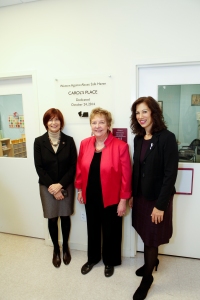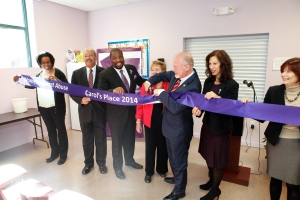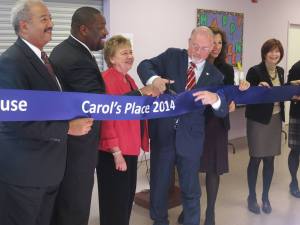By Tara Murtha, WLP Staff
Family violence cuts across race and class, and can happen to anybody. But Philadelphia’s poverty rate, lack of affordable housing and the economic downturn has created a situation that has made it extremely difficult for the most vulnerable victims to plan a route to safety.
Philadelphia has long had only one emergency safe haven for victims of domestic violence.
In recent years, advocates have watched, exasperated, as the number of women and children in desperate need of emergency shelter have been turned away due to a lack of resources.
In 2008, Women Against Abuse had to turn away 1,705 victims.
In 2009, the number swelled to 4,671.
By 2010, it was 7,474.
The economic downturn led, in part, to the spike in demand. After all, you can’t “just leave” when you have nowhere safe to go. Unfortunately, the economy was also the key reason Philadelphia had an insufficient number of beds for a city of its size.
The consequences of a lack of emergency safe haven are dire. In 2009, the city saw a 67% increase in the number of domestic violence homicides.
Recently, after years of work behind the scenes, a new emergency safe haven opened in Philadelphia. With 100 beds, the new shelter doubled the city’s capacity. The shelter is already full; children are sleeping in most of those beds.
Carol’s Place
On Friday, advocates held a ribbon-cutting ceremony to celebrate the new safe haven. At the ceremony, Women Against Abuse Executive Director Jeannine Lisitski officially christened the safe haven Carol’s Place, after Women’s Law Project Executive Director Carol Tracy.
“I can’t tell you how honored I am to stand here today,” Tracy told the small crowd. “The Women’s Law Project and Women Against Abuse are partners in our mission to end family violence. Although I get much credit for it, of course I have a staff behind me, and a board of directors that supports me as well.”
Tracy was a founding member of the board of directors of Women Against Abuse in 1976. In that role, she helped secure the initial funding for the organization, which led to the opening of the first shelter in Philadelphia—one of the first in the Commonwealth–the following year.
That first shelter was just a row house with one toilet next to a noisy bar on a busy street. Within hours of opening, 12 families crammed into the three-bedroom house. People slept on the floor in hallways.
“What is so important is the determination of the women who are leaving, to get away and to escape from domestic abuse,” said Tracy. “That is our charge going forward. We’re working very hard in Philadelphia, not only to provide these kinds of resources but to figure out how to end it.”
In addition to, of course, Women Against Abuse and Jeannine Lisitski, Rep. Chaka Fattah, Councilman William K. Greenlee, Councilman Kenyatta Johnson and Philadelphia Chief of Staff and Deputy Mayor Everett Gillison have all pitched in and championed the project.
“The path we’re on is a path of change and improvement, and it’s slow,” said Tracy. “But what we’re doing is bringing all our resources together.”
The new haven will provide shelter for 600 people a year.
Mixed Emotions
“Mothers and single women will finally be able to rest at night, knowing 24 hour security is on alert,” WAA Executive Director Jeannine Lisitski said. “Many of the women who live here are coming out of fear for their lives. They’ve been stalked. They’ve been threatened [and] they’ve been hurt and attacked, sometimes for years.”
Lisitski invited Councilmen Greenlee and Johnson to say a few words.
“When I learned there was only one DV shelter here in the city of Philadelphia, I understood that it was unacceptable,” said Councilman Johnson. “And it was somewhat embarrassing, because a city as great as a city of Philadelphia, we want to help a population that severely needed our help.”
Councilman Greenlee expressed mixed emotions.
“It’s a sad day that we will need to have shelters, it’s a sad day that we realize also we’re going to have to do more,” said Councilmen Greenlee. “But we do need to celebrate today. Let’s keep moving forward. Let’s keep looking to that day, and maybe it’s well into the future, where domestic violence is a thing of the past.”
Councilman Greenlee did the honors of cutting the purple ribbon.
“I thank you for this honor,” Tracy told the crowd. “I thank you for all the support you’ve given me.”





Carols place was such a blessing for my children and I. I felt safe and a listening ear was always available. The staff is patient, caring and understanding to the families there. I appreciate them and everything that Carols Place has done for me and children. This is a place of people that will always have a special place in my heart.